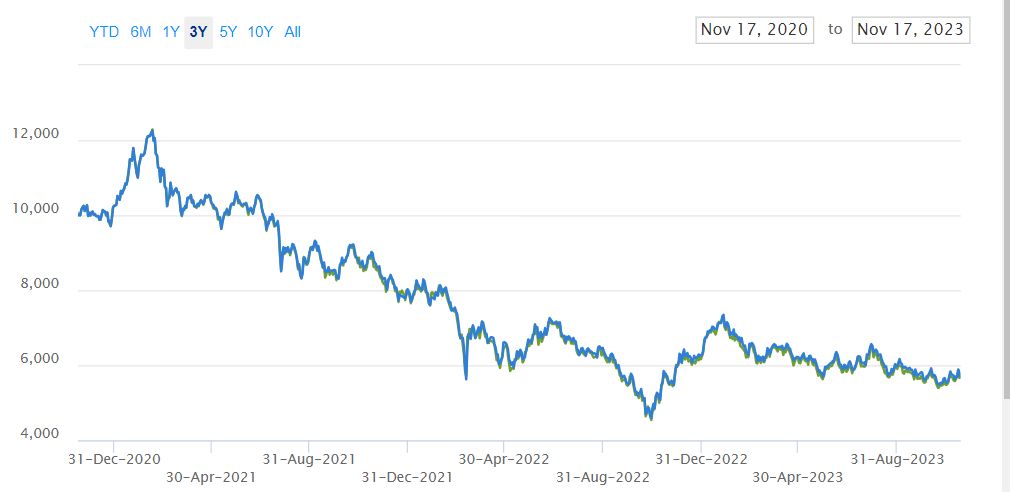Chinese stock markets: they lost 955 billion USD in 2023, what will 2024 be like?

The collapse of the shares of Chinese companies this year was catastrophic for many speculators who had bet on the rise and recovery in 2023, while the so-called "Bears" now seem to have achieved their objective and are satisfied with the results achieved, which do not we know if they will happen again.
According to Bloomberg data, about $955 billion in market capitalization has evaporated from Chinese stocks listed in Hong Kong, Shanghai, Shenzhen and New York this year. China analysts at Wall Street investment banks have had to scale back their targets on economic growth, corporate profits and the yuan.
Alibaba Group, Meituan, JD.com and Ping An Insurance, some of the market heavyweights, fell 10-52% in Hong Kong, while the roughly 700 members of the MSCI China index fell 9% to rank among the top . worst global benchmarks.

At the heart of the debacle is a misassessment of the strength of China's post-Covid economic recovery and the effectiveness of Beijing's political responses. China's fiscal and monetary policies have been disappointing, and debt implosions at China Evergrande and Country Garden have weakened confidence. The yuan's slide to a 16-year low hurt returns. In short, China has disappointed both in terms of its economic strength and its ability to carry out effective expansionary economic policies.
“It's almost impossible to sell someone exposure to China this year,” Jason Hsu, founder and president of Rayliant Global Advisors, said by phone. The Los Angeles-based firm has approximately $17 billion in assets under management. “Clients, whose money we manage, are scared of the headlines.”
This fear could explain the record capital flight from China. Foreign investors have sold more than 170 billion yuan ($23.4 billion) worth of onshore stocks since the end of July, according to data from Stock Connect. According to Daiwa Capital Markets, their ownership in Hong Kong-listed stocks fell to 37% by September from around 44% at the start of 2020.
Rayliant is not alone, as investment strategists at giant fund managers are no longer optimistic about the near-term outlook. BlackRock, for example, downgraded its tactical outlook in mid-September. Hedge fund Bridgewater Associates has sold more than 50% of its Chinese stock holdings.
China analysts at Goldman Sachs, after scaling back their upside targets for the MSCI China index several times this year, downgraded their rating on Chinese offshore stocks to market weight on Nov. 12. In turn, Goldman prefers onshore listed securities which are better protected. from liquidity and geopolitical risks.
Story puts Chinese stocks at risk in slumping housing market, orders Biden
“It's always difficult to predict markets, but this year people were particularly wrong,” said Qi Wang, investment director of UOB Kay Hian's asset management division in Hong Kong. “No one knew what awaited them.”
The narrative and sentiment around Chinese stocks couldn't have been more different 11 months ago. Chinese stocks have been hailed as the best in the world to own, after Beijing abandoned its zero-Covid policy in exchange for a chorus of approval and improvements.
“We raise price targets and expect China to be the top performer in the global stock market in 2023,” Morgan Stanley analysts said in a January note. “We believe the market is underestimating the far-reaching consequences of reopening and the possibility that a robust cyclical recovery could occur despite persistent structural headwinds.”
“We see potential upside of 10% for MSCI China between now and the end of 2023,” JPMorgan analysts said in a report in December last year. “Things should improve thereafter as consumer and business confidence gradually recovers. By the end of 2023, the market could look with greater optimism to the recovery of growth in 2024.”
The confusion over Chinese stocks has been widespread among large financial investors, and not just a problem for P Morgan: Goldman Sachs, Citigroup, Bank of America and Nomura had also announced a year of strong growth for Chinese stocks at the beginning of the year. Goldman, among the most bullish of the group, had predicted 15% growth and a revaluation of the weight of all Chinese finance. A frankly sensational mistake.
Instead, stocks in Japan and India have prospered, absorbing a combined $38 billion in inflows this year, while those in China have shrunk to $11 billion from a high of $30 billion, according to data compiled from Goldman. Emerging markets have too
There is the fact that some institutions do not wish to invest in the Chinese stock market for reasons that are not economic-financial, but political and image-related. This leads to a slowdown in financial flows and their diversion towards markets that are less politically compromising.
We must not then accuse the Chinese government of laziness towards its financial markets: in reality Beijing has tried to do a lot to see the value of its markets grow, both by pushing internal financial institutions towards national investments and by trying to help overall economic growth , and trying to untie the debt problem of real estate developers. We can say that these efforts have not yet reached fruition both due to a non-positive international trend and because perhaps they are not sufficient.
We will see if 2024 will lead to a different direction in the efforts of the Chinese authorities and perhaps the détente between China and the USA after the San Francisco meeting will allow us to see things in a more optimistic way.

Thanks to our Telegram channel you can stay updated on the publication of new Economic Scenarios articles.
The article Chinese stock markets: they lost 955 billion USD in 2023, what will 2024 be like? comes from Economic Scenarios .
This is a machine translation of a post published on Scenari Economici at the URL https://scenarieconomici.it/borse-cinesi-nel-2023-hanno-perso-955-miliardi-di-usd-come-sara-il-2024/ on Sat, 18 Nov 2023 10:00:38 +0000.
